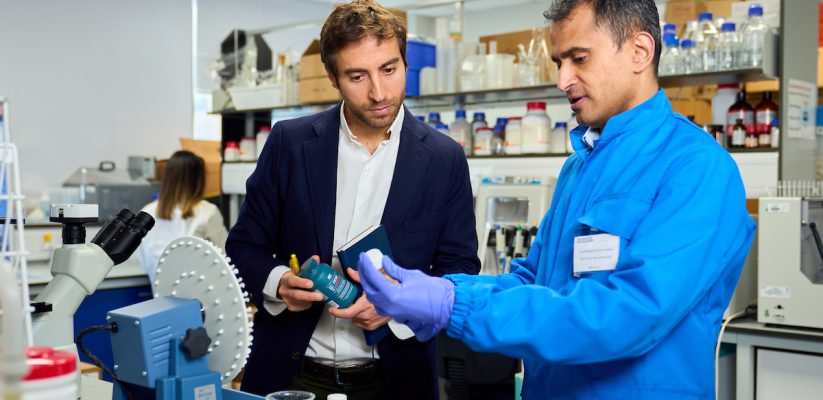Author: Prof Mohammed Gulrez Zariwala
The University of Westminster recently partnered with former Arsenal footballers Mathieu Flamini and Mesut Ozil to develop a range of nutritional supplements. The product range was created at the Centre for Nutraceuticals, University of Westminster, and successfully launched in the international market.
So what exactly are these supplements? To understand this better we need to revisit some fundamentals of diet and nutrition. We know that if we maintain a healthy and balanced diet many of our requirements for nutrients such as vitamins and minerals should be met. As an example, iron is a mineral essential for most biological functions, with humans having a daily requirement of around 15 mg per day. If we consume a diet rich in iron we should be able to meet this requirement, as there are several foods that are a source of iron, such as red meats and the often touted spinach.
We also know that there are various naturally occurring substances present in certain biologically active (‘bioactive’) food components that can have beneficial health promoting effects. Curcumin, a substance present in the curry spice turmeric, is one of the most researched bioactive compounds and has been scientifically shown to be beneficial in a number of conditions ranging from pain and inflammation to healing wounds.
So why is there a need for supplements of any type rather than simply consuming a balanced diet? The answers to this are more complex than may seem initially. Human diet is profoundly shaped by socio-economic and cultural factors. In case of iron, foods that may be a rich source of iron (such as red meat) may simply not be available to a vast number of people due to reasons of affordability or religious or cultural beliefs. Secondly, a food may be a known source of a nutrient such as iron, but the nutrients absorption into the human body following consumption may be impeded by a plethora of factors including possible interactions with other food components and our pre-exiting health state. This is the reason why iron deficiency remains the most common nutritional deficiency across the globe.
In case of bioactive nutrients such as curcumin this is further complicated, as these are highly unstable when outside their natural state as a food component and affected by other components they might be consumed alongside. Additionally, if not extracted, stored, and formulated in a certain way they may become inactive and not bring many benefits even if we consume these in very high quantities.
Here lies the need for well designed ‘supplements’, which, as their designation suggest, can supplement our diet of those nutrients that are beneficial to health but may not be consumed in a quantity or state that brings tangible benefits. Supplements can be based on single nutritional ingredients such as a mineral (iron) or vitamin (vitamin C), or they be multinutrient blends, with nutrients for various bodily needs. It is important to note that all supplements are not created equal, and just as we have food available to us as cheap, processed ‘fast food’ or a more a healthier alternative, supplements can contain ingredients that are low quality and bringing little genuine benefit or high quality, scientifically developed and clinically tested and validated. It is for this reason Flamini and Ozil approached the University of Westminster, as rather than creating an ordinary supplement that sells via marketing hype they felt the need to develop something that would be backed by a body of science and truly help athletes.
For this range of supplements, specific recipe blends were created with scientifically validated nutrients and bioactive ingredients that are known to provide ‘ergogenic’ or performance activity enhancing effects, in quantities known to provide benefit. As with other bioactives, many ergogenic substances can also be obtained from diet. For instance, beetroot is known to be a rich source of inorganic nitrate, a substance that may help increase the delivery of oxygen and nutrients to the muscles during exercise, potentially enhancing performance if consumed on a regular basis in a certain quantity. The supplements developed at the University use a proprietary ingredient that is developed from beetroot yet contains as much as 25 times the amount of nitrates, in a standardised form unaffected by food quality variations. Whether a recreational athlete or an elite sportsperson, nutrition is a fundamental aspect, and supplements may provide us with a ready to use, convenient solution that, in many cases may not be fully achievable by diet alone.
Supplements will not replace balanced nutrition, and neither are they meant to, but if good quality, scientifically validated supplements are used to complement diet they present us a valuable tool to help maintain good health and potentially mitigate disease progression, especially in individuals whose diet might otherwise lack key components due to various socio-economic or cultural reasons.
Author’s biography:
Prof Mohammed Gulrez Zariwala is the Director of the Centre for Nutraceuticals at the School of Life Sciences, University of Westminster. A number of projects he is involved in are ongoing in partnership with global leaders in nutrition supplements and ingredients as well as small and medium UK-based companies. Past knowledge exchange projects include a Knowledge Transfer Partnership (KTP) project that helped in the development of the UK’s top-selling liquid iron supplement product now marketed in 40+ countries worldwide.
Photo – by UNITY
- Do we need supplements to be healthy? - September 1, 2021
- How to reduce the spread of fake news – by doing nothing - August 26, 2021
- Differences empowering solidarity - August 4, 2021
